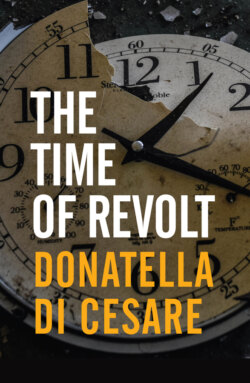Читать книгу The Time of Revolt - Donatella Di Cesare - Страница 8
ОглавлениеBetween Politics and Police
A revolt’s political potential is realized when it manages to highlight injustice within the surveilled confines of the public space and, in so doing, reconfigures this space itself. That is why revolt is above all a practice of irruption – arriving from the margins, it embarrasses government policy and brings its policing function out into the open. This elision is no accident. The etymological link between ‘policy’ and ‘police’ ought to be taken seriously. We can continue along the path that Jacques Rancière indicated as he looked beyond the restrictive meaning usually attributed to the term ‘police’.5 Policing is not simply a matter of truncheons, armoured cars and interrogation rooms, or even just of the state’s repressive apparatus. The so-called public order which the police manage stretches far wider than this apparatus – and, for this reason, the police’s role is decisive, even if it is not always obvious. The police discipline bodies, by allowing them to meet or by banning them from assembling, and also structure space itself, assigning roles, establishing prerogatives and competences – to have, to do, to say. They determine who can occupy what post and regulate the faculty of appearance. But, above all, they govern order – the order of the visible and the speakable, fixing the limits of participation. They include and exclude, discriminating between who does and doesn’t have a share.
Usually, a perspective internal to governance is taken for granted. Thus, beyond the administration of public order, politics vanishes and is reduced to policing alone. Indeed, this is what remains of a politics caught in the pincers of economics and crushed under a well-armoured bureaucratic machinery. This politics ends up as a mere residue, an eloquent reminder of its own tragic absence. But politics cannot be limited to the walls of the pólis alone – especially if that is taken to mean the perimeter of the state. This is especially true in the complex, unstable, fragmentary landscape of the new millennium. Whoever wears the blinkers of governance will be unable to explain the instabilities and tensions within these walls, or still less the movements that agitate the space beyond the borders, vilified as mere chaos and confusion. Everything that comes from the ‘outside’ appears as a spectre: it is both an illusory shadow and an imminent threat. Just as migration is turned into a matter of clandestine intrigues, revolt is cast as dark, apolitical disorder. A normative, governmental approach cannot do otherwise.
Only a politics that takes the opposite approach – one which moves from the edges, breaks down the barriers, and refuses any policing function – can redeem the name of politics. Such a politics is present wherever conflicts explode, wherever struggles break out. It makes injustice a shared problem for all; it puts dissent on display, sheds light on the invisible and the vilified, defends those with nothing to defend, contradicts the present divisions and shows the contingency of order. It breaks the policing hierarchy of arché, which claims a monopoly on principle and purports to have established its own command. There is no politics, if not in the anarchic interruption, in the breach where, as soon as the call for equality can make itself audible, it contradicts the governmental logic. This breach is the space where the being-together of the community is constantly rebuilt anew.
Notes
1 5 See Jacques Rancière, ‘Wrong: Politics and Police’, in Disagreement: Politics and Philosophy. Minneapolis: University of Minnesota Press, 2008.
